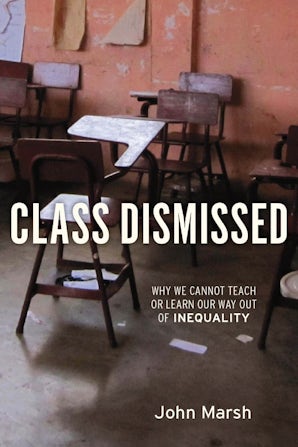John Marsh talks to Inside Higher Ed about Class Dismissed
July 26, 2011
by Serena Golden
It’s no secret that this country has an education problem. Whether pre-K or post-grad, the consensus is clear: we need more and better education. Too few students make it through high school, and fewer still make it through college; in any case they are not learning enough, or they are not learning the right things in the right way. The child left behind in school will never go to college, and the child who doesn’t go to college becomes the adult who will never attain a reasonably well-paying job. Education, then, is the key to prosperity — for individual workers and for the nation that comprises them.
But wait.
Is it possible that this ubiquitous narrative results from a sort of tunnel vision? That education isn’t the best solution to poverty or economic inequality — that it may not even be a solution at all?
Those are the questions that John Marsh asks — and answers — in his new book, Class Dismissed: Why We Cannot Teach or Learn Our Way Out of Inequality (Monthly Review Press). Marsh, an assistant professor of English at Pennsylvania State University, makes the case that Americans have come to imbue education with a level of significance that the facts do not and cannot support.
Poverty and inequality, Marsh argues, are dire problems for all of us — even those who’ve never known financial hardship and probably never will. But education cannot make them go away: it is simply not possible for all Americans to earn college degrees, and “[i]nsisting that they really should is neither a wise nor a particularly humane solution.” And if all Americans did graduate from college, then college would no longer be any guarantee of a good job and a decent living (or rather, it would be even less of one than it is now)….
Read the entire interview in Inside Higher Ed

